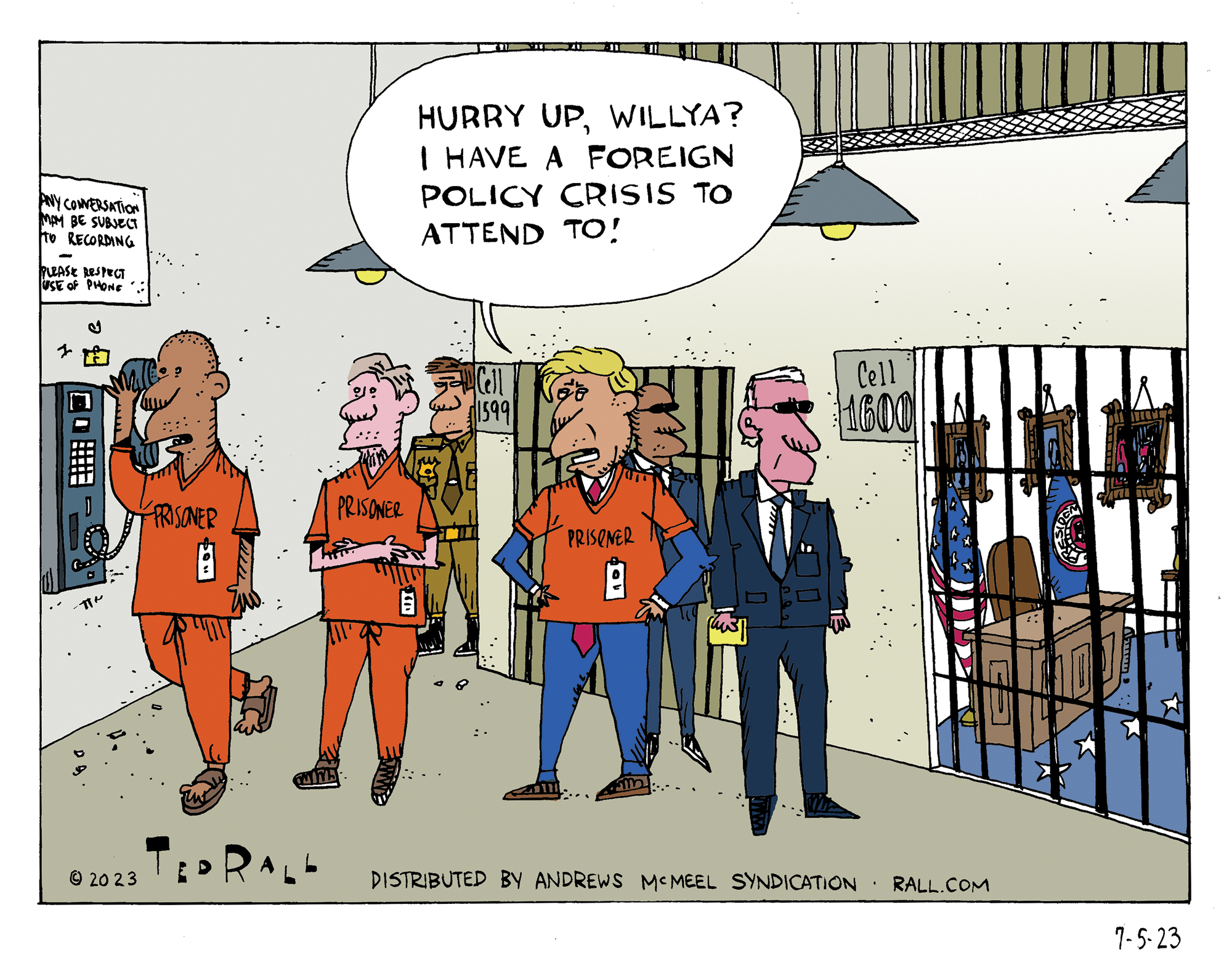
Each time Donald Trump has been indicted, his poll numbers went up—among Republican voters who closed ranks around him in response to what they decried as politically motivated “lawfare.” Now he enjoys a commanding lead for the GOP nomination.
Of course, it’s one thing to win the nomination of your party, an exercise that requires motivating the hardcore partisans who form the ideological base. To prevail in a general election, conventional wisdom says, you’ll need to appeal to moderates and swing voters. Democrats pivot right after their summer convention; Republicans don’t pivot left as much as they pull back their red meat appeals to the right.
That said, corporate media seems determined not to plumb the depths of cluelessness-driven embarrassment they displayed in 2016, when the New York Times told readers on election morn that Hillary had an 85% chance of winning. “Trump is not only in a historically strong position for a nonincumbent to win the Republican nomination, but he is in a better position to win the general election than at any point during the 2020 cycle and almost at any point during the 2016 cycle,” CNN reports.
Still, the question remains. Can the ultimate base-dependent candidate reach beyond his MAGA partisans as he seeks reelection?
Two factors suggest that he can.
One is a data point: A June 21st Quinnipiac poll found that 62% of voters believe that the Department of Justice has been weaponized against Trump and that the federal charges against him for mishandling classified documents, for which he faces more than 400 years in prison, are politically motivated. Biden and the Democratic Party probably don’t even admit it to themselves—but that includes a lot of Democratic voters. 28% of Democrats think Trump’s legal troubles are more about politics than his wrongdoing.
And here’s a major warning sign: 65% of independents agree.
Some of those Democrats think Trump’s the victim of a witch hunt—and they love it. Anything to get rid of him works for them. An AP-NORC poll from April found that 57% of respondents thought Manhattan District Attorney Alvin Bragg’s charges against Trump for falsifying business records were politically-motivated; the same percent (not the same cohort) approved.
And yet—those independents. Neither red nor Blue No Matter Who, a good portion of them disapprove of the way Trump has been targeted. Even among the Democrats, some want Trump gone while not liking the way he’s been forced to play subpoena whack-a-mole. As the charges and hearings pile up, those feelings can only increase in number and intensity.
The other factor is a major component of America’s national character; we love us an underdog. We’ve subscribed to the underdog myth “ever since 13 scrappy colonies went up against the largest empire in the modern world. The beauty of America is everybody can think of themselves as an underdog in some way,” historian Ed Ayers told NPR in 2018.
Brian Balogh, another historian, added: “We have people like Donald Trump, who has styled himself as an underdog. I mean in fact, Donald Trump came from quite a wealthy background, but he’s somebody who feels no matter what kind of advantage he has in politics, the whole system is rigged against him. I don’t think you can understand Donald Trump unless you understand that the vast majority of people who voted for [Hillary] Clinton came from counties where the economy is contributing a disproportionate amount to the GDP, and those who voted for Trump came from counties where, where they live is underrepresented in America’s economy. They are literally underdogs.”
Swarming Trump with civil lawsuits, state and federal indictments has fed into Trump’s longstanding narrative that this heir to a multimillion-dollar real-estate empire who attended an Ivy League school and hobnobbed with starlets and presidents is actually a victim of a cabal of privileged coconspirators, and not merely a sad-sack punching bag but a noble warrior fighting more for everyday people than himself. Joe and Jane Sixpack don’t stow military plans in their bathroom or pay hush money to porn stars or rip off aspiring college kids or try to overturn elections, yet they empathize more with the perpetrator of these deeds than the authority figures attempting to hold him to account. Truly, it’s a political miracle.
What these prosecutors don’t seem to know (and probably shouldn’t care about) is that we, the people, hate their guts much more than we look down on the crass self-dealing and personal corruption of someone like Trump or, for that matter, Biden. Everyone has gotten a ticket or a tax bill they thought was unfair. Everyone has felt disrespected by a cop and unheard by a judge and screwed over by the government and, in general, the justice system. (My favorite relevant aphorism: we don’t have a justice system, we have a legal system.) Americans disapprove of the Supreme Court by a 2-to-1 margin, 41% think civil courts are unfair and 80% want substantial reform to the criminal justice system.
For some voters, the choice won’t come down to Trump and Biden. It’ll be Trump versus The System writ large. If I were Trump, even if I were sitting behind bars on election day—especially—I’d like my odds.
(Ted Rall (Twitter: @tedrall), the political cartoonist, columnist and graphic novelist, co-hosts the left-vs-right DMZ America podcast with fellow cartoonist Scott Stantis. You can support Ted’s hard-hitting political cartoons and columns and see his work first by sponsoring his work on Patreon.)

